|
|
|
Sort Order |
|
|
|
Items / Page
|
|
|
|
|
|
|
| Srl | Item |
| 1 |
ID:
130996
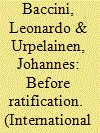

|
|
|
|
|
| Publication |
2014.
|
| Summary/Abstract |
When do international treaties cause domestic policy adjustments? While previous research emphasizes the consequences of treaty ratification, we argue that the need to secure entry into force can induce states to change their policies already before ratification. If a state expects benefits from a treaty, it can increase the probability of foreign ratification by implementing policies that benefit pivotal domestic players within its partner country. Accordingly, studies that focus on policy change after ratification underestimate the importance of treaties and partly misconstrue the causal connection between treaties and policies. We test the theory against data on the relationship between North-South preferential trading agreements (PTAs) and automobile emission standards, finding that developing countries adopt automobile emission standards between the signature and ratification of North-South PTAs.
|
|
|
|
|
|
|
|
|
|
|
|
|
|
|
|
| 2 |
ID:
117054
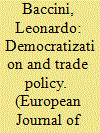

|
|
|
|
|
| Publication |
2012.
|
| Summary/Abstract |
I show that the process of democratization in developing countries constitutes an important factor in the formation of preferential trade agreements. Specifically, democratizing developing countries are more likely to form a preferential trade agreement with richer countries, whereas there is little evidence that democratic transition affects the probability of a developing country joining a preferential trade agreement with other developing countries. This result follows naturally from median voter preferences and the Heckscher-Ohlin and Stolper-Samuelson theorems. Put simply, the median voter gains from trading with the richer states and loses from trading with the other poor states. Since preferential trade agreements allow countries to waive the most-favored nation principle, the need for both trade openness and protectionism against competitors might explain why preferential trade agreements constitute one of the main features of the current wave of globalization. I quantitatively test this hypothesis using a newly compiled dataset that covers 135 developing countries from 1990 to 2007. An important implication of this article is that it could be more challenging than expected to combine domestic political equality with international economic equality.
|
|
|
|
|
|
|
|
|
|
|
|
|
|
|
|
| 3 |
ID:
153607


|
|
|
|
|
| Summary/Abstract |
While increasing trade and foreign direct investment, international trade agreements create winners and losers. Our paper examines the distributional consequences of preferential trade agreements (PTAs) at the firm level. We contend that PTAs expand trade among the largest and most productive multinationals by lowering preferential tariffs. We examine data covering the near universe of US foreign direct investment and disaggregated tariff data from PTAs signed by the United States. Our results indicate that US preferential tariffs increase sales to the United States from the most competitive subsidiaries of multinational corporations operating in partner countries. We also find increases in market concentration in partner countries following preferential liberalization with the United States. By demonstrating that the gains from preferential liberalization are unevenly distributed across firms, we shed new light on the firm-level, economic sources of political mobilization over international trade and investment policies.
|
|
|
|
|
|
|
|
|
|
|
|
|
|
|
|
| 4 |
ID:
160572


|
|
|
|
|
| Summary/Abstract |
This research note presents a new dataset on the speed of tariff liberalization in sixty-one preferential trade agreements (PTAs) signed by fifty states and regional economic organizations over the period 1995 to 2013. We use this dataset to test prominent arguments concerning the impact of intra-industry trade and global value chains on the political economy of trade. Our results indicate that the speed of tariff liberalization through PTAs is considerably faster for intermediate goods than for finished products. This is in line with the most prominent argument about how global value chains affect the political economy of trade liberalization. At the same time, we find mixed evidence for the impact of intra-industry trade on the ease of trade liberalization, which reflects strong cross-country variation. We conclude with a discussion on how the dataset can help tackle important questions in international political economy and inform ongoing debates on trade agreements.
|
|
|
|
|
|
|
|
|
|
|
|
|
|
|
|
| 5 |
ID:
139407
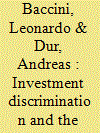

|
|
|
|
|
| Summary/Abstract |
The proliferation of bilateral and regional trade agreements has arguably been the main change to the international trading system since the end of the Uruguay Round in the mid-1990s. We argue that investment discrimination plays a major role in this development. Preferential trade agreements can lead to investment discrimination because of tariff differentials on intermediary products and as a result of provisions that relax investment rules for the parties to the agreement. Excluded countries are sensitive to the costs that this investment discrimination imposes on domestic firms and react by signing a trade agreement that aims at leveling the playing field. We test our argument using a spatial econometric model and a newly compiled data set that includes 166 countries and covers a period of eighteen years (1990–2007). Our findings strongly support the argument that investment discrimination is a major driver of the proliferation of trade agreements.
|
|
|
|
|
|
|
|
|
|
|
|
|
|
|
|
| 6 |
ID:
112887
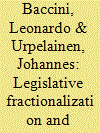

|
|
|
|
|
| Publication |
2012.
|
| Summary/Abstract |
This article shows that legislative fractionalization and leftward (but not rightward) partisan shifts increase the volatility of public R&D expenditures in new energy technologies. We develop a highly accurate estimator for public energy R&D expenditures, and examine deviations from the estimated values using data for member states of the International Energy Agency, 1981-2007. Given that unpredictable fluctuation in public spending on new energy technology reduces the positive effect of such spending on innovation, our empirical analyses imply that countries with fractionalized legislatures can improve the performance of their energy technology programs by enacting institutional mechanisms that reduce the volatility of public spending. Similarly, the results indicate that left-wing and right-wing governments can improve the performance of public technology programs through agreements that distribute gains in such a fashion that partisan shifts do not cause spending cuts. Contravening the conventional wisdom, we also find that public energy R&D is unusually stable in the United States.
|
|
|
|
|
|
|
|
|
|
|
|
|
|
|
|
| 7 |
ID:
146158


|
|
|
|
|
| Summary/Abstract |
Existing research indicates the interrelated nature of different dimensions of the design of international institutions. In particular, it shows the greater flexibility of deep agreements. We argue—and demonstrate empirically—that the positive relationship between depth and flexibility holds for preferential trade agreements (PTAs). But we add two qualifications to the conventional wisdom that depth and flexibility go hand in hand. First, we argue that the positive relationship between depth and flexibility proves weaker for democracies than for nondemocracies. Second, when making deep agreements more flexible, countries also add strings to the use of the additional flexibility provisions. An original data set on the design of 587 PTAs allows us to test our arguments. Both descriptive evidence and multivariate statistics support the theoretical expectations. The findings contribute to the literatures on the design of international institutions and the causes and consequences of PTAs.
|
|
|
|
|
|
|
|
|
|
|
|
|
|
|
|
| 8 |
ID:
183775


|
|
|
|
|
| Summary/Abstract |
While the firm-level distributional consequences of market liberalization are well understood, previous studies have paid only limited attention to how variations in domestic institutions across countries affect the winners and losers from opening up to trade. We argue that the presence of coordinated wage-bargaining institutions, which impose a ceiling on wage increases, and state-subsidized vocational training, which creates a large supply of highly skilled workers, generate labor market frictions. Upward wage rigidity, in particular, helps smaller firms weather the rising competition and increasing labor costs triggered by trade liberalization. We test this hypothesis using a firm-level data set of European Union countries, which includes more than 800,000 manufacturing firms between 2003 and 2014. We find that, for productive firms, gains from trade are 20 percent larger in countries with liberal market economies than they are in coordinated market economies. Symmetrically, less productive firms in coordinated market economies experience significantly smaller revenue losses compared to liberal market economies. We show that both the presence of an institutionalized wage ceiling and the availability of subsidized vocational training are key mechanisms for reducing the reallocation of revenue from unproductive to productive firms in coordinated market economies compared to liberal market economies. In line with our theory, we find that wages and employment in liberalized industries increase differentially across both types of labor markets. Finally, we provide suggestive evidence that trade liberalization triggers a differential demand for redistribution at the individual level across different labor markets, which is in line with our firm-level analysis.
|
|
|
|
|
|
|
|
|
|
|
|
|
|
|
|
| 9 |
ID:
132507
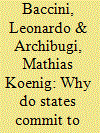

|
|
|
|
|
| Publication |
2014.
|
| Summary/Abstract |
Ratifying core conventions adopted by the International Labor Organization (ILO) creates legal obligations to improve labor standards in the domestic economy, notably with regard to union rights, minimum age and discrimination in employment, and forced labor. Why and when do states choose to ratify them? Two influential theoretical approaches lead to the expectation that states are influenced by the ratification behavior of other states. Drawing on rationalist institutionalism, the authors expect states to use institutions such as the ILO to improve or consolidate their preferred standards domestically while reducing the risk of suffering competitive disadvantages in world markets. In this view, ILO conventions are devices for the prevention and mitigation of regulatory races to the bottom among trade rivals. Drawing on sociological institutionalism, they expect states to ratify ILO conventions if doing so conforms to a norm of appropriate behavior that is prevalent in a state's peer groups. This article develops observable implications of these hypotheses and tests them by applying spatial regression models to seven core ILO conventions and 187 countries between 1948 and 2009. The analysis yields strong evidence in support of both hypotheses.
|
|
|
|
|
|
|
|
|
|
|
|
|
|
|
|
|
|
|
|
|